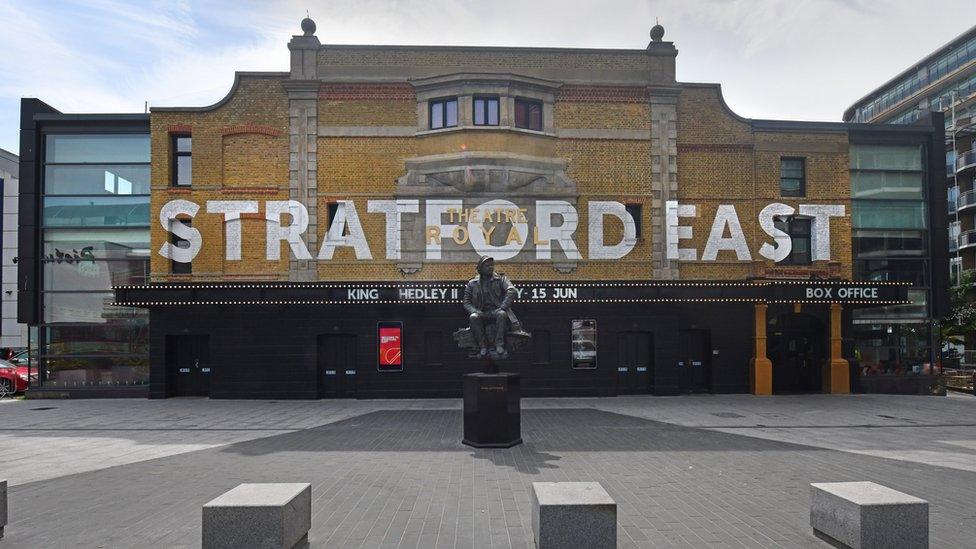Slave Play: No 10 criticises black-only audiences plan
- Published
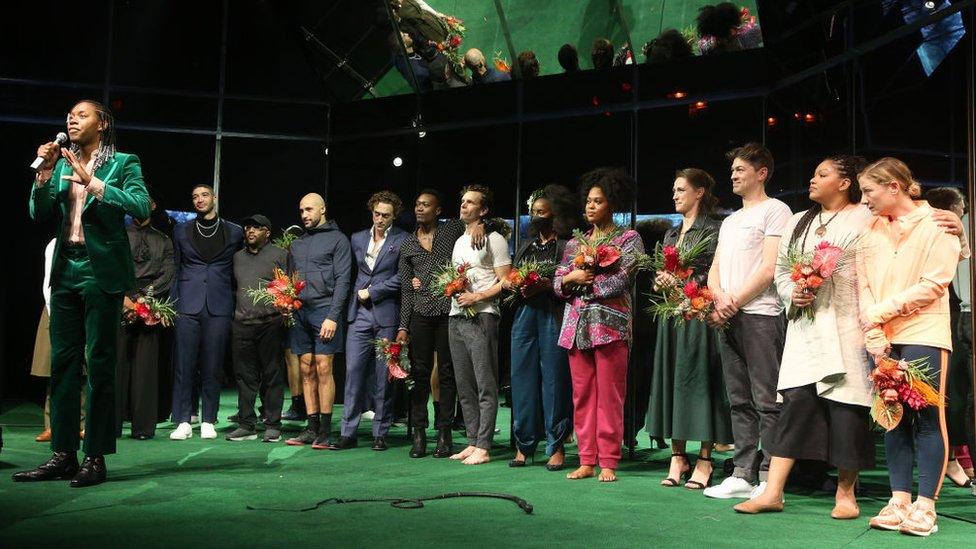
Slave Play received 12 nominations at the 74th Tony Awards, breaking the previous record held by Angels in America
A West End production of Slave Play that plans to host some shows for black audiences only has been criticised by Downing Street as "wrong and divisive".
The Noel Coward Theatre, external will hold two "Black Out" performances solely for an "all-black-identifying audience".
Set on a plantation in the old American South, the controversial play explores "race, identity and sexuality".
Written by US actor and playwright Jeremy O Harris, it has received more Tony nominations than any other play.
Prime Minister Rishi Sunak's official spokesman said media reports about some showings being "free from the white gaze" were "concerning" and No 10 was seeking further information.
"The prime minister is a big supporter of the arts and he believes that the arts should be inclusive and open to everyone, particularly where those arts venues are in receipt of public funding," the spokesman said.
"Restricting audiences on the basis of race would be wrong and divisive."
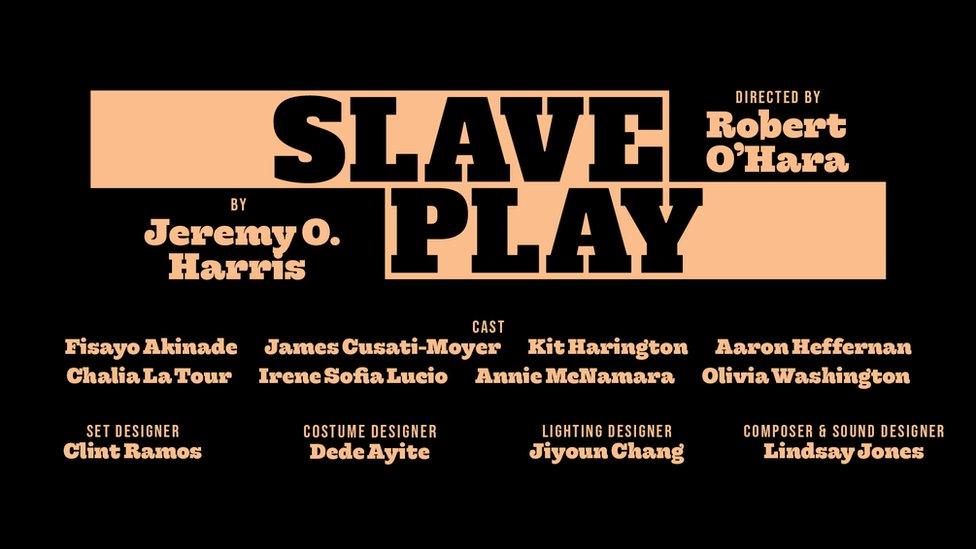
The artwork for the West End staging of Slave Play at the Noel Coward Theatre
Slave Play's producers told BBC News that the "intent is to celebrate the play with the widest possible audience.
"We want to increase accessibility to theatre for everyone.
"The Broadway production conceived of Black Out nights and we are carefully considering how to incorporate this endeavour as part of two performances in our 13-week run.
"We will release further details soon. To be absolutely clear, no-one will be prevented or precluded from attending any performance of Slave Play."
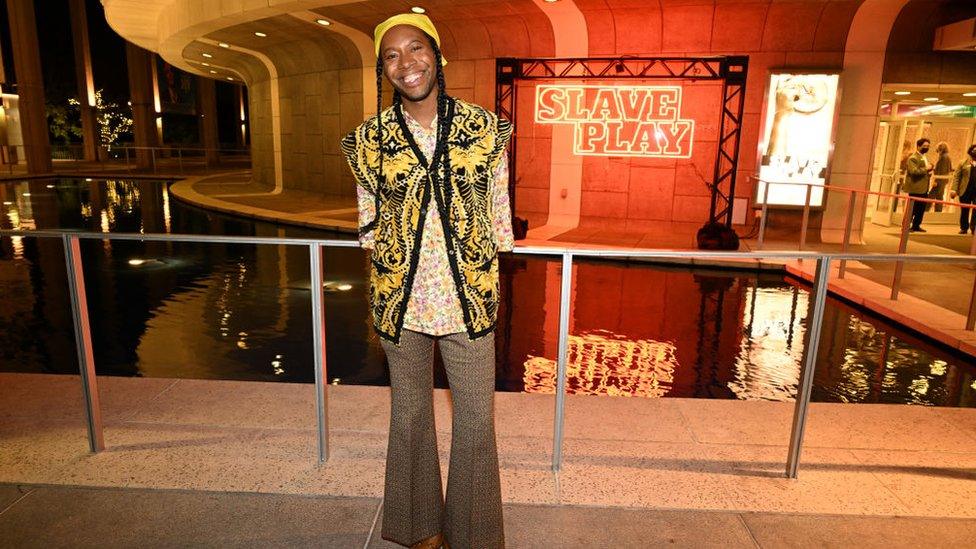
Jeremy O Harris at the 2022 opening of Slave Play in Los Angeles which has generated both acclaim and controversy over its subject matter and production decisions
In an interview with the BBC's World at One radio programme this week, Harris explained the reasoning behind a Black Out night.
"The idea of a Black Out night is to say: this is a night that we are specifically inviting black people to fill up the space, to feel safe with a lot of other black people in a place where they often do not feel safe."
"I think that one of the things that we have to remember is that people have to be radically invited into a space to know that they belong there. In most places in the West, poor people and black people have been told that they do not belong inside of the theatre.
"In America, Jim Crow existed to literally tell them that they could not sit in the same theatre as white people.
"As someone who wants and yearns for black and brown people to be in the theatre, who comes from a working class environment, and so wants people who do not make over six-figures a year to feel like theatre is a place for them, it is a necessity to radically invite them in with initiatives that say 'you're invited. Specifically you'."
'Trails blazed'
On Thursday Harris also defended the Black Out decision on social media after being criticised by some users on X, formerly Twitter, for allegedly being "racist against white people".
"I don't have to imagine the roles were reversed in my grandparents' lifetimes AND WORSE," he wrote on X.
"I'm not even saying BLACKS ONLY I'm saying I'm inviting black ppl first! They can bring their white friends or lovers if they want. There's no colour bar. But one existed in the UK recently!"
Allow X content?
This article contains content provided by X. We ask for your permission before anything is loaded, as they may be using cookies and other technologies. You may want to read X’s cookie policy, external and privacy policy, external before accepting. To view this content choose ‘accept and continue’.
The 34-year-old said he did not "take it lightly that this play is one of the rare plays by a black author that has made its way to the West End".
"I'm incredibly grateful for the trails blazed by the myriad black British writers recently who have broken ground for black writers and audiences on the West End like Arinzé Kene, Kwame Kwei-Armah, Tyrell Williams, Ryan Calais Cameron, and Natasha Gordon.
"I hope that with this production even more work by writers of colour will find support on our largest commercial stages."
In the BBC interview with World at One host Sarah Montague, he acknowledged the controversy Slave Play has generated, including petitions for it to not be shown.
"I think that all those things are really beautiful and necessary," he told the BBC. "Hard questions should invoke loud responses, both of celebration and censorship, right?"
When asked whether he thinks the response to the play in the UK is going to be different to that in the US, especially around race issues, Harris responds that he's "not sure".
"There is a very loud reason for why British audiences or British theatre-makers often feel as though racial discourse is outsourced to American writers," he told the BBC after a pause.
"The race plays that happen here or plays where race is centre to the themes are often written by black writers. I know that a lot of black British writers that I'm friends with feel sort of frustrated and alienated by that.
"And so I hope that this will be an invitation for more plays by black Brits to come and have those conversations."
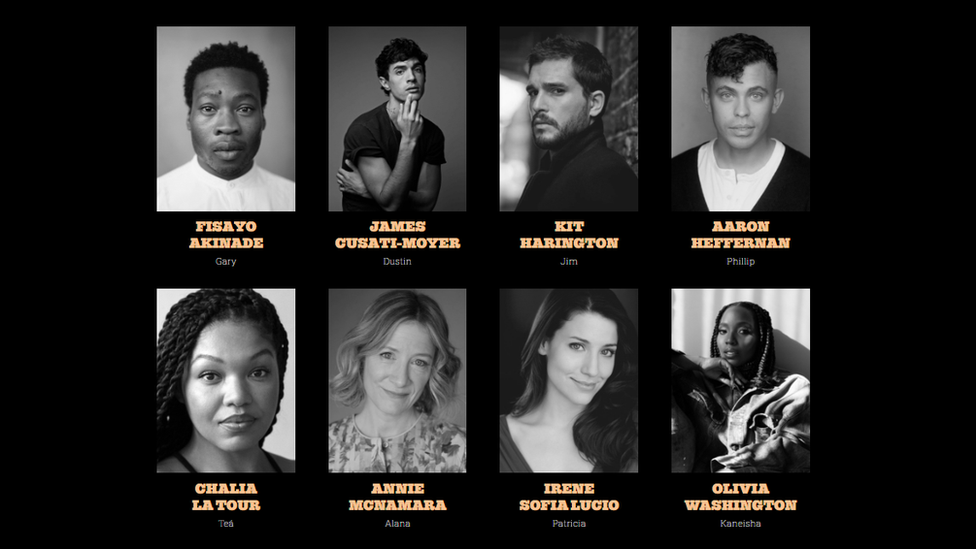
The West End cast of Slave Play includes Banana star Fisayo Akinade and Denzel Washington's daughter Olivia Washington
Slave Play received 12 nominations at the 74th Tony Awards, breaking the record previously set by the revival of Angels in America. It did not bring home any wins.
Game of Thrones star Kit Harrington and Denzel Washington's daughter Olivia Washington are among the ensemble cast.
In an interview with the Guardian, external newspaper, Harris criticised commercial theatre relying on celebrity castings because it makes people treat theatre "like a Disney World attraction, where the play is background to the amusement of seeing their favourite celebrity in front of them".
However Harris believes Harrington will not be a "distraction" because he is not a lead character in the play and was impressed with his acting.
The Yale School of Drama graduate is also among the creatives warning about how elitist Broadway and West End tickets have become.
"It is way too expensive," he told the BBC.
I didn't see my first Broadway play until a year before my play went to Broadway. And I only got to see it because I was going to Yale, and someone else bought my ticket for me. But I am not someone who grew up ever seeing a play. That's why I love British theatre so much because I knew plays from reading them".
Harris' producers have apparently set aside over 200 tickets per week starting at £1 with some seats priced at £20.
The UK premiere of Slave Play is scheduled for 29 June. It will run until September 21. The two scheduled Black Out nights are 17 July and 17 September.
- Published23 May 2023
